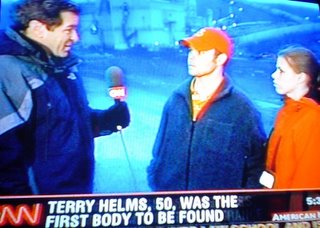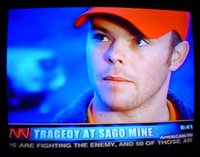
Exploiting the victims & their families...
“Get the widow on the set!
We need dirty laundry
You don’t really need to find out what’s going on
You don’t really want to know just how far it’s gone
Just leave well enough alone
Eat your dirty laundry”
(1982, Dirty Laundry lyrics by Don Henley from the album "I Can't Stand Still)
Moving from one mess to the next, the media circus in West Virginia has traveled up I-79 to Morgantown to Ruby Memorial Hospital and now to Pittsburgh’s Allegheny General Hospital to follow the lone survivor’s medical treatment from this week’s mining disaster. But little substantive, enterprising reporting has come out of the hundreds of reporters, photographers, freelance producers and bookers, satellite and audio techs, etc., chasing this story.
Right now it’s all about getting wave after wave of reaction from the victim’s families—exploiting private pain—asking that lame-old question: “how do you feel?” Newsbreakers has satirizes this situation in the past with that groups take of asking “what’s the mood?”
This pathetic procession of interviews featuring victims and their grief fails to advance the story. How many interviews and follow up interviews and follow up to the follow up interviews does it take before the market for victim and family reaction is saturated. When is it time to leave these people alone?
 How many times can the same newspaper, the same local or cable news operation or network news magazine announce to the world that they have an exclusive interview with the survivor’s wife or the widow or the son of one of the dead miners.
How many times can the same newspaper, the same local or cable news operation or network news magazine announce to the world that they have an exclusive interview with the survivor’s wife or the widow or the son of one of the dead miners.Sure these families agree to talk, but how tacky, even ghoulish is it to ask them to talk over and over-- night after night-- from Larry King Live to Dateline NBC. How many different interviews does a single network need-- separate ones for GMA, Primetime Live, 20/20 & World News Tonight? But hey, I bet someone has promised someone a trip to Disney World as they prepapre a network pitch for Extreme Makeover: Home Edition. What's next, a walk on appearance during the The Bachelor. It may happen as these families and now the doctors are becoming pseudocelebrities in this tragic reality show playing out live on TV.
And speaking of doctors, I've always wondered what happens with the tightened HIPPA regulations protecting one's personal and private health information in these cases. It's impossible to find out the condition of a shooting or traffic accident victim for a local story, but what kind of paper work do they file waiving HIPPA so doctors can hold these news conferences. Then these physcians, who pledged to do no harm, appear live on the Fox New Channel and MSNBC revealing intimate medical details to the world. Wouldn't one simple news conference be enough for eveyrone-- why do the doctors need to talk one-on-one with every cable news anchor over. Should they get agents to handle all the bookings? What's next, appearance fees?
The scheduled news conferences would also seem an appropriate place for the media to exact its pound of flesh from these poor souls. But it's immediately after the news conferences end that the network & cable news swoop in with their freelance field bookers and producers armed with gifts, cash and even cell phones to make sure they secure a one-on-one, live interview with yet another coifed talking TV head.
From exposing and showing the notes from the dead miners to chasing down family members in the hospital cafeterias. From stalking church members to eavesdropping at local diners. These are just some of the tactics local reporters covering this story have noted to me. They characterize it as nasty and cut-throat when it comes to the behavior of the network and cable freelancers. It’s even come to near shoving matches in a few cases.
It would appear the networks insulate themselves from accusations of checkbook and driveby journalism by using these hungry freelancers. That way if complaints of unethical practices go public, the suits at the network can distance themselves by saying that sort of thing goes against company policy and employee of their news organization would never do such a thing.
When I teach BC 111 (Broadcast Writing) this semester, I’ll definitely use this as a learning moment about the problem of sensationalism, the danger of becoming too competitive, the rush to be first and lameness and sameness of this type of reporting. It merely exploits and sensationalizes the pain and suffering of victims and soils the credibility of the professional journalist engaged in more ethical practices.
One resource I will likely tap into for all my journalism courses this semester will be the Dart Center for Journalism & Trauma--a resource of guidelines and ethical approaches for journalists covering stories such as the mine disaster. Perhaps scolding the members of the media circus currently in town is futile. But I can offer my students lessons learned and tools to develop the character and credibility they need to change the things we've watched go horribly wrong during this week's coverage.